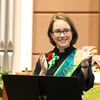
Begin with the end in mind.
These words are used in a variety of contexts, and they are good, good words. If you don't know where you're going, you'll probably never get there. And when we're talking about intergenerational faith formation, they're especially important.
For most of our programs, curriculum will offer us an "end." Usually it's a learning objective, or a weekly takeaway phrase. And while those "ends" are important, the "end" in intergenerational faith formation is seldom found in the form of a catch phrase.
When it comes to intergenerational faith formation, the "end" you're working toward is always relationships.
Sometimes, in our preparation we can focus so much on the journey (crafts, activities, drama, stories) that we forget our destination. So when we look at the curricular "ends," like learning objectives, we have to frame those in light of our larger vision of relationship building.
In the same way, the practical elements of our curriculum should not require a specific, unified outcome from all participants. While single-generation activities can take into account age and developmental stage, intergenerational activities must be flexible enough that individuals and families can take the amount of time that is right for them, and go as deep as is appropriate for them, which means their outcomes will vary significantly.
My favorite intergenerational hands-on activities involve design, and they invite creativity. Instead of having to build a specific item, have them create or start with a simple basic item and make it their own. Or, tell them the item you want them to build, and give them free rein to use a variety of materials to create it.
For example, instead of a step-by-step instruction guide with identical supplies for groups to build a model of the wall of Jericho, offer a table full of craft supplies, or even something as simple as a pile of wooden blocks or Legos, and invite intergenerational groups to simply "build a wall." Allow them to determine their own outcome as a group, or as smaller groups within the larger group.
These design-focused activities require conversationto complete, so instead of having intergenerational instruction-reading-and-following, you create a scenario where generations are having to make decisions together, which requires them to discuss their own likes and dislikes, preferences and experiences.
Some groups will go into great detail and spend as much time as they can designing and creating their product. Others will do a minimal amount of crafting, but spend their time discussing the topic at hand. Every group will have a different outcome, and that creates another opportunity for sharing between groups, and telling the story of how they made the choices they made to other groups.
So while we always want to begin with an end in mind, in an intergenerational Sunday School experience, we must keep at the forefront of our purpose and planning that our ultimate "end" is relationships. If deeper relationships between generations are your outcome, you've succeeded!



